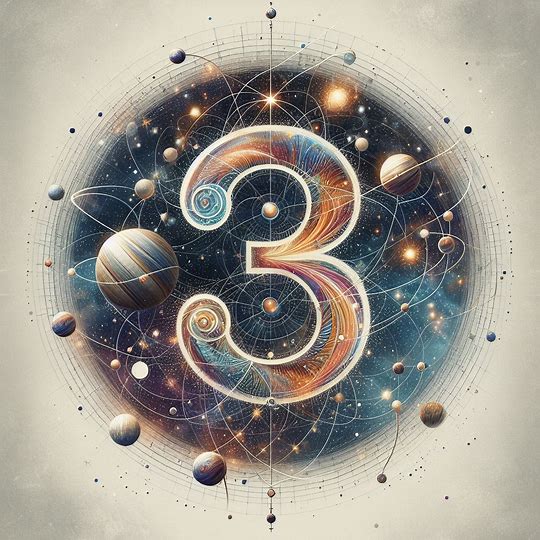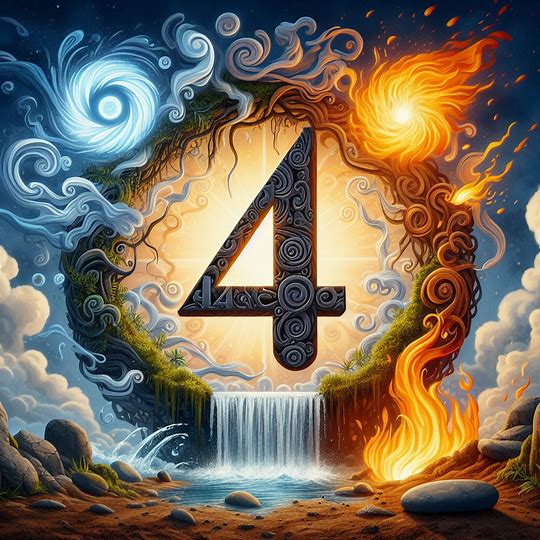Numbers carry deep spiritual significance in the Bible, often revealing profound truths about God’s character, sovereignty, and perfect plan. Among these numbers, 19 emerges as a intriguing and thought-provoking figure, appearing in various contexts throughout the Scriptures.
In this article, we will explore the biblical events involving the number 19, its representation in the Hebrew language, and the profound spiritual insights it offers. As we delve into the meaning and significance of this number, may we gain a deeper appreciation for God’s sovereign hand in history and the importance of trusting in His perfect will for our lives.
Key Takeaways:
- The number 19 appears in significant biblical events, symbolizing God’s sovereignty, faithfulness, and the completeness of His plan.
- In Hebrew, 19 is represented by the letters Yod (10) and Tet (9), carrying spiritual meanings of humility, divine creation, goodness, and truth.
- The fulfillment of prophetic words, particularly in Jesus’ life and ministry, is often associated with the number 19.
- Biblical accounts involving 19 emphasize obedience to God’s call and trusting in His timing.
- Frequently encountering 19 may serve as a spiritual prompt to trust God, seek His will, remain obedient, and deepen one’s relationship with Him.
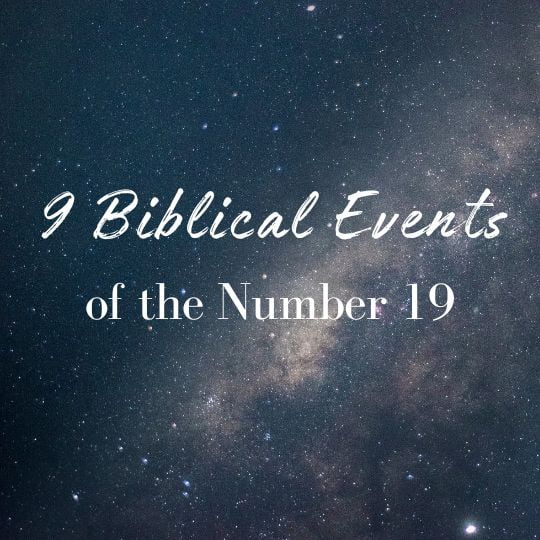
Biblical Events Involving the Number 19
- Judah’s history as a kingdom (930 to 586 B.C.): Judah was governed by 19 men and 1 woman (Queen Athaliah) before being conquered by Babylon in 586 B.C., resulting in the destruction of Jerusalem and the temple, and the people being taken captive.
- Dead Sea Scrolls discovered in 1947: Among the Dead Sea Scrolls found in 1947, 19 copies of the Book of Isaiah were identified.
- Nahor’s life span: Nahor, the father of Terah and grandfather of Abraham, lived 119 years after begetting Terah, reaching the age of 148.
- Civil war after David became King over Judah: In a battle during the civil war, David’s army lost 19 soldiers, while Abner’s forces lost 360. Abner killed Joab’s brother, Asahel.
- Naphtali’s inheritance in the Promised Land: The Israelite tribe of Naphtali received 19 cities as part of their inheritance in the Promised Land.
- Isaiah’s prophecy and Jesus’ ministry: Isaiah prophesied about the land of Naphtali and Zebulun seeing a shining beacon, which was fulfilled during Jesus’ life and ministry, as recorded in Matthew.
- Jesus moves to Capernaum: At the age of 30, Jesus moved from Nazareth to Capernaum to start His ministry and preach the gospel.
- The Hebrew calendar: The Hebrew calendar is based on a 19-year cycle, with an additional month added in years 3, 6, 8, 11, 14, 17, and 19 of each cycle. It takes 19 days to observe all of God’s annual Feast days.
- Jonah’s mission to Nineveh: Jonah was tasked with warning Nineveh about its impending destruction. Despite initially trying to avoid his responsibility, he eventually obeyed God’s call.
Number 19 in Hebrew
In the Hebrew alphabet, each letter is associated with a numerical value, a concept known as gematria. The number 19 is represented by combining two Hebrew letters: יט (Yod = 10, Tet = 9). Let’s explore the spiritual significance of these letters and their combined numerical value.
1. Yod (י):
Yod is the tenth letter of the Hebrew alphabet and has a numerical value of 10. It is the smallest letter in the alphabet, often considered a symbol of humility and the spark of divine creation. In Jewish mysticism, Yod represents the essence of God’s name and the beginning of all things.
“By the word of the Lord the heavens were made, their starry host by the breath of his mouth.” (Psalm 33:6, NIV)
2. Tet (ט):
Tet is the ninth letter of the Hebrew alphabet, with a numerical value of 9. It is often associated with goodness, purity, and the concept of truth. In Jewish tradition, Tet is considered a symbol of the hidden wisdom and mysteries of God.
“He has hidden me in his shelter in the day of trouble; he has concealed me under the cover of his tent; he has lifted me high upon a rock.” (Psalm 27:5, ESV)
3. The Combined Significance of Yod and Tet (19):
When the numerical values of Yod (10) and Tet (9) are combined, they form the number 19. This combination can be interpreted as a representation of God’s goodness and the revelation of divine wisdom. It may also symbolize the interplay between the humility of human existence (Yod) and the goodness and truth of God (Tet).
“The fear of the Lord is the beginning of wisdom, and the knowledge of the Holy One is insight.” (Proverbs 9:10, ESV)
In the context of gematria, the number 19 is often associated with the Hebrew word “חוה” (chavah), which means “to live” or “to give life.” This connection further emphasizes the idea of God as the source of life and the one who reveals hidden wisdom.
“In him was life, and that life was the light of all mankind.” (John 1:4, NIV)
In conclusion, the number 19 in Hebrew, represented by the letters Yod (י) and Tet (ט), carries spiritual significance related to God’s goodness, divine wisdom, and the essence of life. As we encounter this number, may we be reminded of God’s character and the depth of His wisdom, while always grounding our understanding in the truth of His revealed Word.
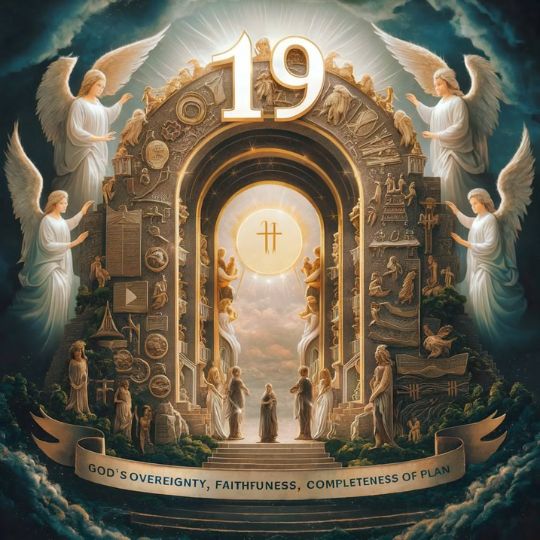
The Meaning and Significance of the Number 19
The number 19 carries rich symbolism and spiritual significance in the context of Biblical numerology.
God’s sovereignty and faithfulness in fulfilling His promises:
The recurring appearance of the number 19 in the Bible can be seen as a testament to God’s sovereign control over history and His faithfulness in fulfilling His promises to His people. From the 19 kings of Judah to the 19 copies of Isaiah found in the Dead Sea Scrolls, God’s hand can be traced through these events, showcasing His unwavering commitment to His plan and purpose.
“For the word of the Lord is right and true; he is faithful in all he does.” (Psalm 33:4, NIV)
The completeness of God’s plan and purpose:
In Biblical numerology, the number 19 is often associated with the idea of completeness or wholeness. This suggests that when God’s plan and purpose are at work, they are comprehensive and all-encompassing. The appearance of the number 19 in various biblical accounts can be interpreted as a sign of the perfection and completeness of God’s divine will, even in the face of human failings and challenges.
“The Lord works out everything to its proper end—even the wicked for a day of disaster.” (Proverbs 16:4, NIV)
The fulfillment of prophetic words, as seen in the life and ministry of Jesus Christ:
The number 19 is particularly significant in the context of biblical prophecy. For example, Isaiah’s prophecy about the land of Naphtali and Zebulun seeing a great light was fulfilled during Jesus’ life and ministry. The 19 cities allocated to the tribe of Naphtali as part of their inheritance in the Promised Land can be seen as a foreshadowing of this prophetic fulfillment. This connection highlights the importance of the number 19 as a symbol of God’s faithfulness in bringing His prophetic words to pass, especially through the life and work of Jesus Christ.
“For prophecy never had its origin in the human will, but prophets, though human, spoke from God as they were carried along by the Holy Spirit.” (2 Peter 1:21, NIV)
The importance of obedience to God’s call and trusting in His timing:
The biblical accounts featuring the number 19 often involve individuals or nations facing challenges and the need for obedience and trust in God’s timing. The story of Jonah, though not directly tied to the number 19, exemplifies this theme. Jonah’s initial reluctance to obey God’s call and his eventual submission to God’s will demonstrates the importance of obedience and trust in God’s timing. Similarly, the 19 kings of Judah faced various trials and challenges during their reigns, and their success or failure often depended on their obedience to God and their trust in His sovereign plan.
“But be sure to fear the Lord and serve him faithfully with all your heart; consider what great things he has done for you.” (1 Samuel 12:24, NIV)
In conclusion, the number 19 in Biblical numerology carries profound spiritual significance, pointing to God’s sovereignty, faithfulness, and the completeness of His plan and purpose. It also highlights the importance of obedience and trust in God’s timing, as demonstrated through the fulfillment of prophetic words and the challenges faced by individuals and nations in the Bible. By recognizing the symbolism of the number 19, believers can be encouraged to deepen their faith, trust in God’s plan, and seek to live in obedience to His will.
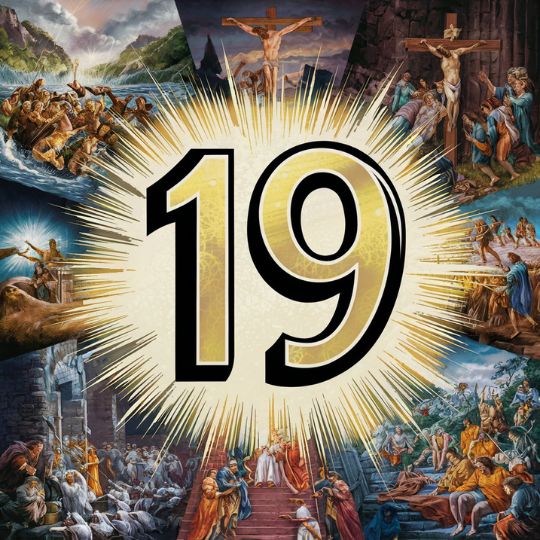
Final thoughts
If you find yourself frequently encountering the number 19, take it as a divine invitation to pause, pray, and trust in God’s perfect plan for your life. Seek His guidance and wisdom, knowing that He is always in control and working for your good, even in the midst of life’s uncertainties.
Remember that God’s ways are higher than our own, and His love for you is unwavering. Cling to His promises, trusting that He will guide you along the path He has set before you. Embrace the peace that comes from surrendering your worries to Him and believing that He has a beautiful destiny prepared for you.
As you continue on your faith journey, let the number 19 serve as a reminder of God’s goodness, sovereignty, and deep love for you. Trust in His divine plan, seek His direction, and rest assured that, in the end, you will understand the purpose and meaning behind every step of your journey.
“Trust in the Lord with all your heart, and lean not on your own understanding; in all your ways acknowledge Him, and He shall direct your paths.” (Proverbs 3:5-6, NKJV)
